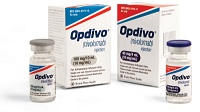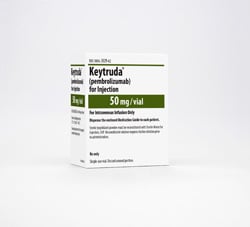
The Bristol-Myers Squibb-vs.-Merck match in melanoma is on. Bristol-Myers ($BMY) scored FDA approval for its cancer immunotherapy Opdivo (nivolumab) three months ahead of schedule, setting it up for a head-to-head contest against Merck's ($MRK) recent debut in the same class, Keytruda.
Both Keytruda and Opdivo block PD-1, a mechanism cancer cells use to escape detection by the body's immune system, and as cancer immunotherapies, they're among the hottest tickets in oncology these days. Keytruda and Opdivo are the first two drugs of their class, but a slate of competitors are working their way toward market, with ongoing trials in a wide range of cancer types.
But PD-1 drugs do not come without a price. Merck's drug sells for about $150,000 per patient for a year's worth of treatment, while Bristol-Myer's product runs at about $143,000 per patient for a year's supply in Japan where the drug is currently marketed, The Wall Street Journal reports. On a monthly basis, the price is about par, ISI Group analyst Mark Schoenebaum told investors in a Monday note, with both Keytruda and Opdivo ringing in at $12,500.
Opdivo was approved on the strength of Phase III trial data showing a 32% objective response rate in patients with previously treated advanced melanoma, compared with an 11% ORR in chemotherapy patients. Merck has also charted impressive data for its own PD-1 melanoma fighter, showing that Keytruda yielded a 24% overall response rate in previously treated patients.
Meanwhile, Bristol-Myers is doing its best to keep Merck's competitor in check. In September, the company slapped Merck with a patent lawsuit over the use of PD-1 antibodies. Bristol-Myers and partner Ono Pharmaceutical claim that Merck started developing Keytruda after they had already made progress with Opdivo, and demand royalties on sales of rival PD-1 drugs.

But Bristol-Myers and Merck are not the only companies vying for a spot in the PD-1 market. Big names like AstraZeneca ($AZN) and Roche ($RHHBY) are hard at work on potential rivals, ramping up R&D and looking for approvals for their products. Roche's melanoma PD-L1 candidate RG7446 is in clinical trials, including ongoing Phase I combination trials with Roche's Avastin and Zelboraf. AstraZeneca is forging ahead with Phase III trials for its PD-1 candidate, MEDI4736. The drug showed a 46% disease control rate after 12 weeks in a Phase I study in patients with advanced solid tumors.
In the melanoma market, Keytruda and Opdivo join a growing list of new treatments. Bristol-Myers' immunotherapy Yervoy hit the ground running after its 2011 debut, earning a spot on FiercePharma's list of drug launch superstars. Plus, there's Roche's targeted treatment Zelboraf, which launched the same year, and a pair of targeted meds from GlaxoSmithKline ($GSK), Tafinlar and Mekinist. Bristol-Myers is studying Yervoy in combination with Opdivo for melanoma, while Roche is doing the same with its Zelboraf-plus-RG7446 combo. Roche also hopes to expand its market share for Zelboraf with a BRAF-targeted combination therapy. The Swiss drugmaker and partner Exelixis ($EXEL) earlier this month asked the FDA to approve their cocktail, which targets melanoma patients with a V600 mutation in their BRAF genes.
- read the FDA's statement
- get Bristol-Myers Squibb's statement (PDF)
- here's the WSJ article (sub. req.)
- and here's FierceBiotech's take
Special Report: Top 10 best-selling cancer drugs of 2013 | Top 15 drug launch superstars - Yervoy, Bristol-Myers